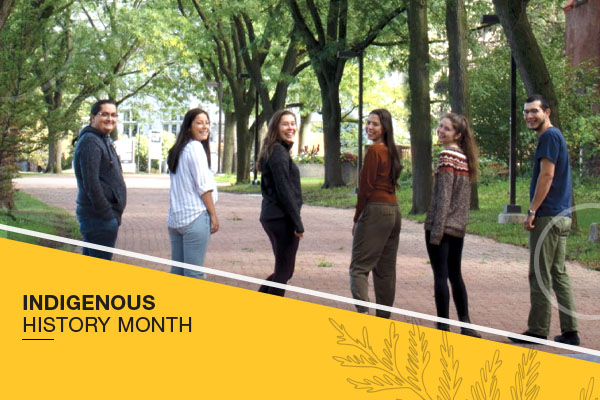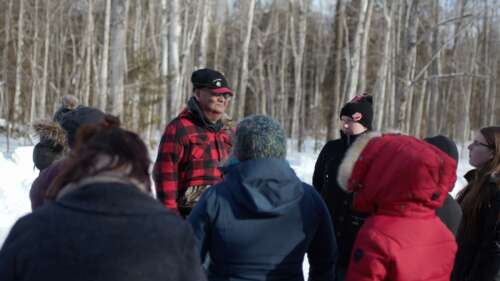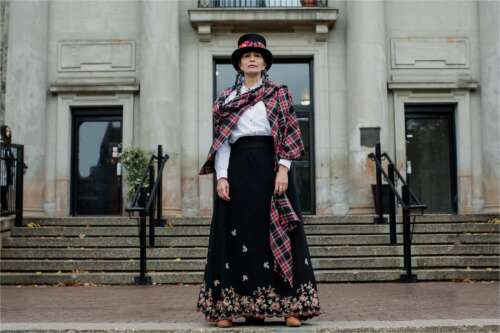 Earlier this year, the University of Guelph built on its commitment to decolonization and reconciliation with the launch of the Indigenous Initiatives Strategy Report aimed at developing, enhancing, supporting and evaluating Indigenous initiatives on campus.
Earlier this year, the University of Guelph built on its commitment to decolonization and reconciliation with the launch of the Indigenous Initiatives Strategy Report aimed at developing, enhancing, supporting and evaluating Indigenous initiatives on campus.
Developed on the foundation of existing initiatives and guided by Indigenous knowledge, the strategy summarizes 150 recommendations on the indigenization of the University’s services, policies, practices and campus environment.
The report, Bi-naagwad: It comes into view, was developed by the Indigenous Initiatives Strategic Task Force, created by the President’s Advisory Committee on Indigenous Initiatives and made up of faculty, staff, students and Indigenous community members.
“The goal of this report is to provide actionable steps that will guide the University forward,” said Dr. Cara Wehkamp, special advisor to the president on Indigenous initiatives and co-lead of the task force. “It’s an important step in the ongoing work that is happening here to build and foster an environment where Indigenous peoples and knowledges can flourish.”
Miptoon Chegahno, councillor, Chippewas of Nawash Unceded First Nation and Knowledge Holder, and a member of the advisory committee said, “The strategy provides a path for transforming education and research, which is essential for the strengthening of relationships between Indigenous and non-Indigenous people and to move toward a brighter future for all.”

Task force members met monthly during 2019 and 2020 to review and discuss the University’s current policies and practices under the strategic themes of governance, campus environment, Indigenous student support, research and scholarship, and pedagogy and curriculum.
The summary report consists of six topics:
• Maadakamigad | Guiding the way forward
• Izhitwaawin | Enhancing campus culture
• Mino inawendimin | Cultivating responsible relationships
• Ge gikinoo’amawend | *Wholistic development of Indigenous learners
• Nanda ‘gikendamowin | Seeking, listening and meaning-making
• Gikinawaabindimin | Learning together
Each topic includes several priority actions, including enhancing Indigenous representation in governance; fostering and incorporating First Nations, Inuit and Métis culture and spiritual practices across campus; expanding services, programming and support for Indigenous students; establishing a full-time Elder or Knowledge Holder position; and developing a framework to indigenize curriculum.
“For the benefit of Indigenous students for years to come, we must do the hard work now,” said Paige Saunders, co-chair of the Indigenous Student Society and a task force member. “I hope this project sets a standard for other universities to model their supports after, and that it extends far past the scope we have imagined.”
The report also highlights recent successful initiatives, including provisions for Indigenous cultural and spiritual practice including smudging, pipe ceremonies and the lighting of the qulliq; increasing the number of Indigenous student scholarships; developing the bachelor of Indigenous environmental science and practice program along with Indigenous communities; and the upcoming construction of Nokom’s House, a land-based research lab in the Arboretum that will bring together Indigenous scholars.

“Indigenous and non-Indigenous students alike are now asking for education about the historical truths and the ongoing injustices faced by Indigenous peoples within Canada, while also seeking access to Indigenous ways of knowing,” said Dr. Kim Anderson, professor in the Department of Family Relations and Nutrition and co-lead of the task force. “Indigenous ways of knowing bring critical approaches as we address the social and environmental challenges before us.”
Anderson, who is the Canada Research Chair in Indigenous Relationships, added, “As a meeting place for ideas and innovation, universities can bring together Indigenous and other knowledge systems to provide hope and serve the future.”
Several projects are under way across campus to address short-term recommendations within the strategy; other recommendations require further engagement with First Nations, Inuit and Métis peoples and the campus community. Annual progress reports on the strategy will be shared with the President’s Advisory Committee on Indigenous Initiatives, U of G’s Senate and Board of Governors, and the community.
“The presence and recognition of First Nations, Inuit and Métis peoples, communities, cultures and ways of knowing have grown across campus, but there is still much work to be done,” said U of G president Dr. Charlotte Yates, chair of the advisory committee. “I am grateful to the University community members and the Indigenous community members who came together to develop this important report that will guide us forward. We recognize that indigenization and reconciliation are active processes and are committed to evolving our strategy to ensure that First Nations, Inuit and Métis peoples lead and thrive.”
*the term wholistic is used instead of holistic in reference to Indigenous wholistic theory which is relational and cyclical encompassing the balance and completeness of the mental, emotional, physical and spiritual aspects of self and community, grounded in the teachings of Creation and the past, present and future.